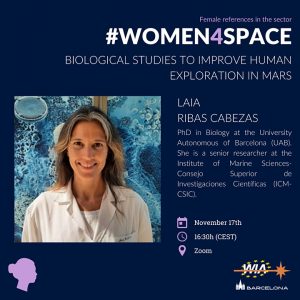 Join Women in Aerospace – Europe Barcelona on the 17th November from 16:30-17:30 CET for “Biology in Space: biological studies to improve human exploration in Mars” by Laia Ribas
Join Women in Aerospace – Europe Barcelona on the 17th November from 16:30-17:30 CET for “Biology in Space: biological studies to improve human exploration in Mars” by Laia Ribas
Food resources and food availability are important factors towards providing enough food for human consumptions in space. In Nüwa, a designed Martian city for one million people, all food resources were envisioned to work in a closed cycle in which equilibrium of the living organisms is essential and where biology is a central science to improve human exploration.
Zebrafish, a model organism for many research fields, including aquaculture, helps to better understand the gravity effects on human and animal physiology, including alterations of the molecular pathways in the cells. Mars Desert Research Station (MDRS) is a perfect Mars analogous station where biological experiments can be performed. Thus, Hypatia, a Catalan woman crew, will perform, among others, biological experiments in the MDRS to improve human exploration in space.
Laia Ribas is a senior researcher at the Institute of Marine Sciences-Consejo Superior de Investigaciones Científicas (ICM-CSIC). She studied at the Autonomous University of Barcelona (UAB) where she obtained her doctorate in biological sciences in 2006. She worked as a postdoc at the Imperial College of London (UK). She leads her own research team (Repro-Immune Team) to study the effects of the environmental factors, which include gravity effects on the development of the reproduction and immune systems in fish.
She is interested in identifying molecular markers with the aim of improving fish productivity. She is a member of SONET and participated in the awarded Nüwa project to design a city for one million people on Mars. She is committed to outreach by participating, for example, in Hypathia project and by leading projects, for example, Sex in the Sea-ty.
